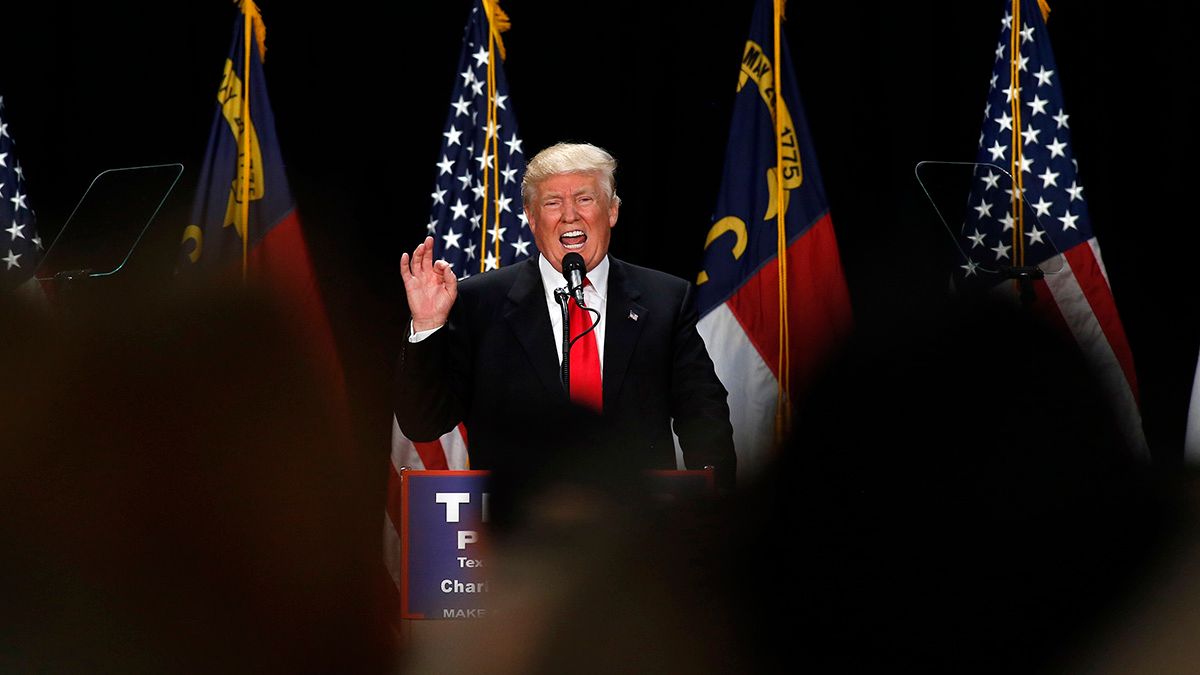On June 8, 2023, former U.S. President Donald Trump announced on his Truth Social website that he had been summoned to appear in court. This matter related to a federal indictment that alleged the mishandling of classified documents at his Mar-a-Lago Club in Palm Beach, Florida.
On the next day, the indictment was unsealed. The document detailed seven charges for a total of 38 counts. The majority of the counts involved the willful retention of national defense information, while the other counts included conspiracy to obstruct justice, withholding a document or record, corruptly concealing a document or record, concealing a document in a federal investigation, scheme to conceal, and false statements and representations.
At around the same time, social media users began to repost a purported Trump quote regarding how "No one will be above the law" when it comes to "the protection of classified information." A reader also previously requested that we look into the authenticity of this quote.
In this story, we'll lay out the facts and history behind this genuine quote. We'll also take a brief look at a 19th-century U.S. president who was the first to be arrested for a much different kind of charge.
'No One Will Be Above the Law'
The statement in question was uttered by Trump on Aug. 18, 2016, during an appearance at one of his presidential campaign rallies in Charlotte, North Carolina.
While speaking in front of a crowd, Trump said, "In my administration, I'm going to enforce all laws concerning the protection of classified information. No one will be above the law."
"In my administration, I'm going to enforce all laws concerning the protection of classified information. No one will be above the law."
-- Donald Trump August 18, 2016 (Charlotte NC rally)
— Howard Mortman (@HowardMortman) June 9, 2023
We transcribed the relevant portion of Trump's speech in order to give readers a sense of what he was talking about both before and after he made the remark. (This part of the rally begins at the 43:36 mark in this C-SPAN video.)
On health care, we are going to repeal and replace the disaster called Obamacare. Countless Americans have been forced into part-time jobs. Premiums are about to jump by double digits yet again. And just this week, Aetna announced it is pulling out of the exchanges all over, but also in North Carolina. We are going to replace this disaster with reforms that give you choice and freedom and control in health care at a much, much lower cost. You'll have much better health care at a much lower cost, and it'll happen quickly.
On political corruption, we are going to restore honor to our government. In my administration, I'm going to enforce all laws concerning the protection of classified information. No one will be above the law. I am going to forbid senior officials from trading favors for cash by preventing them from collecting lavish speaking fees through their spouses when they serve. I'm going to ask my senior officials to sign an agreement not to accept speaking fees from corporations with a registered lobbyist for five years after leaving office, or from any entity tied to a foreign government.
Finally, we are going to bring our country together. It is so divided. We are going to bring it together. We are going to do it by emphasizing what we all have in common as Americans. We are going to reject bigotry, and I will tell you, the bigotry of Hillary Clinton is amazing. She sees communities of color only as votes and not as human beings worthy of a better future. It's only votes. It is only votes that she sees, and she does nothing about it. She's been there forever and look at where you are.
This Trump quote about "the protection of classified information" appeared on page 9 of the June 2023 federal indictment, as did several other past statements made by Trump on the same subject.
Clinton Emails Versus Trump Docs
Trump's August 2016 remark about protecting classified information was an apparent reference to an FBI investigation that took place during the same year. That investigation concerned his challenger, then-Democratic presidential candidate and former Secretary of State Hillary Clinton, and her unauthorized use of a private account for official business when she was secretary of state, as well as a private email server that resided in the basement of her Chappaqua, New York, home.
In July 2016, the FBI announced that it was recommending no charges in the case. Then, just days before voters headed to the polls, the case was reopened and then closed again, still with no charges being brought against Clinton.
According to FactCheck.org, whose reporting cited data from the FBI, Clinton used a personal email system to conduct business on a private server, though to be clear there was more than one physical piece of computer equipment used to operate this server through the years:
FBI Director James Comey said there were "several different servers and administrators of those servers during her four years at the State Department." The FBI director added, "As new servers and equipment were employed, older servers were taken out of service, stored, and decommissioned in various ways."
The FBI investigation ultimately found that "2,115 emails on the Clinton server were classified — 2,028 at the confidential level, 65 at the secret level, and 22 at the top secret level, which is the most sensitive," according to the Washington Post.
One specific subject of controversy related to this matter was the fact that 31,380 of Clinton's emails had been deleted. The email messages that were removed were purportedly deemed to be of a private, personal nature and not related to work, a claim that could not be proven once the emails became unavailable.
The apparent timeline of the emails' deletion was of particular consequence. It was on March 4, 2015, that a U.S. House committee investigating the Benghazi, Libya, attacks issued subpoenas for Clinton's emails.
Six days later, Clinton was presented with a natural question about this matter. A reporter who was not identified in a transcript asked, "How could the public be assured that when you deleted emails that were personal in nature, that you didn't also delete emails that were professional, but possibly unflattering?"
In response, Clinton didn't appear to directly answer the question, but did indicate that she believed she didn't do anything different from how other government employees might delete emails they believe to be of a personal nature.
Later during that same month and after the subpoena had been issued, the 31,380 emails that were said to contain content of a personal nature were deleted, according to documents released by the FBI on Sept. 2, 2016.
Here's how FactCheck.org broke down the timeline:
By December 2014, Clinton's lawyers had completed their review of her emails, and sent her work-related emails to the State Department. At that time, a Clinton lawyer told Platte River Networks – which was maintaining Clinton's private server – that the former secretary no longer needed any emails that were more than 60 days old, and instructed an unnamed PRN employee "to modify the e-mail retention policy … to reflect this change." The PRN employee told the FBI that "sometime between March 25-31, 2015″ he realized he did not make the change requested by Clinton's office and he deleted her old emails at that time.
Trump later mentioned the House committee's subpoena for Clinton's emails during the second presidential debate on Oct. 9, 2016. He said, in part, "There has never been anything like this where e-mails, and you get a subpoena. You get a subpoena, and after getting the subpoena you delete [the] e-mails and then you acid wash them or bleach them, as you would say."
Note: Trump's mention of "acid wash" and "bleach" was based on the name of software that was said to have been used to delete the content from Clinton's email server. The name of that software: BleachBit. In other words, the notion that anyone had literally poured acid or bleach on computer parts was a misleading and confused rumor.
As for the case against Trump, it involved more than one attempt by federal officials to recover physical documents of a sensitive nature that were located at Trump's Florida estate.
The Associated Press reported the timeline as follows:
A Trump representative told the National Archives in December 2021 that presidential records had been found at Mar-a-Lago. In January 2022, the National Archives retrieved 15 boxes of documents from Trump's Florida home, later telling Justice Department officials that they contained "a lot" of classified material.
That May, the FBI and Justice Department issued a subpoena for remaining classified documents in Trump's possession. Investigators who went to visit the property weeks later to collect the records were given roughly three dozen documents and a sworn statement from Trump's lawyers attesting that the requested information had been returned.
But that assertion turned out to be false. With a search warrant, federal officials returned to Mar-a-Lago in August 2022 and seized more than 33 boxes and containers totaling 11,000 documents from a storage room and an office, including 100 classified documents.
In all, roughly 300 documents with classification markings — including some at the top secret level — have been recovered from Trump since he left office in January 2021.
In sum, Clinton's case reportedly involved thousands of instances of sensitive information being transmitted in emails, as well as 31,380 messages that were deleted in the weeks after she received a congressional subpoena, while Trump's case was about hundreds of physical documents of a sensitive nature that, after receiving a subpoena, were not all turned over to federal authorities when investigators first visited Trump's property, as well as a number of other aspects of the case that were still unfolding in June 2023.
Trump Was Not the First President To Be Arrested
As of this writing, Trump was set to appear in court in Miami on June 13, according to The Associated Press.
Trump is the first former president in U.S. history to face federal charges. He also was the first president to be impeached twice.
Previously, in March 2023, Trump faced another indictment. However, that one was at the state level. The 34-count felony indictment in the state of New York alleged the falsification of business records "in order to conceal damaging information and unlawful activity from American voters before and after the 2016 election," according to the Manhattan District Attorney's Office.
Trump is the first former president to face federal charges, but he's not the first person to assume the presidency and be arrested.
In 1872, former U.S. President Ulysses S. Grant was arrested while serving his first term in the White House. The charge: speeding through the streets of Washington in a horse-drawn carriage.

